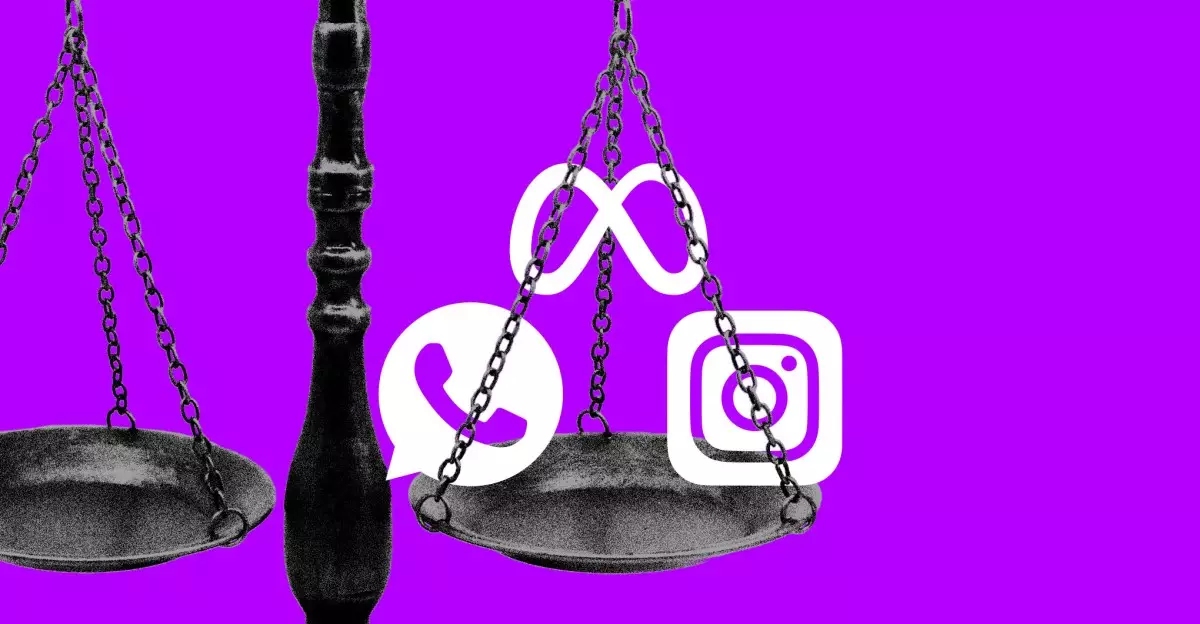In a landmark courtroom setting, the tension was palpable as Mark Zuckerberg, CEO of Meta, took the stand during the Federal Trade Commission’s (FTC) high-profile antitrust trial. The core of the dispute revolved around the government’s contention that Zuckerberg’s acquisitions of WhatsApp and Instagram were not motivated by a desire for improvement but rather by a strategy to eliminate competition. This courtroom saga, laid out over the course of Zuckerberg’s approximately 13 hours of testimony, did not just address the legality of past decisions but also illuminated the broader implications for the tech industry and anti-competitive behavior.
What made this trial riveting was not merely the stakes but the complexities surrounding them. As Zuckerberg faced questioning from both the FTC and Meta’s own legal team, one thing became clear: the challenge of defining intent in the high-octane world of technology. Zuckerberg’s assertion that he would “do it again” after paying a staggering $19 billion for WhatsApp in 2014 demonstrates a certain level of confidence in the initial strategic vision. However, this confidence must be interrogated in light of the FTC’s claims, which argue that these acquisitions were more about stifling competition than about nurturing innovation.
The Strategic Value of WhatsApp and Instagram
Zuckerberg’s defense hinged significantly on the premise that his acquisitions were less about neutralizing competition and more about adaptation to evolving market dynamics. During his testimony, Zuckerberg highlighted a pivotal shift in online communication—one that favored privacy and intimate conversations over public interactions on platforms like Facebook. He positioned WhatsApp as a transformative asset in the face of this shift, asserting that the messaging app would provide Meta with leverage against corporate giants like Apple and Google, both essential gatekeepers to app distribution.
Zuckerberg emphasized his perception of WhatsApp’s potential drawbacks. He described the founders, Jan Koum and Brian Acton, as being “unambitious” and uninterested in expanding their services. This raises pertinent questions about the management of innovation within acquired entities. Rather than viewing the acquisition as a means to suppress competition, Zuckerberg sought to create an environment conducive to growth—evidenced by his eventual push for social features within WhatsApp. It’s a narrative that, while self-serving, offers an interesting lens through which to analyze leadership in technology—especially the responsibility of tech moguls towards the innovations they bear under their umbrella.
The Rise of Instagram and Competitive Dynamics
The evolution of Instagram presents an intriguing counterpoint to the WhatsApp case. Acquired for $1 billion, Instagram has flourished into a platform with over 2 billion users—outstripping predictions made at the time of purchase. Zuckerberg’s testimony outlined a gradual concern for Instagram’s competition with Facebook, highlighted by his directive to minimize feature integrations between Instagram and Facebook.
Internal emails uncovered during the trial indicate that Zuckerberg was initially unperturbed by Instagram’s presence. However, upon reaching 1 billion users, his concern reportedly peaked. This change in stance raises important questions about the nature of competition within tech ecosystems. Did Zuckerberg’s later moves represent genuine misgivings about Instagram’s potential to siphon engagement from Facebook, or were they part of a broader strategic dance—a preemptive strike against a rival that had the potential to overshadow Facebook?
This dynamic ultimately culminated in a rift with Instagram’s co-founders, Kevin Systrom and Mike Krieger, who felt sidelined as the Facebook empire expanded. The fact that their relationship deteriorated following strategic pivots underscores the often tumultuous interplay between innovation, acquisition, and corporate governance in Silicon Valley.
The Implications for Future Acquisitions and Competition
Zuckerberg’s courtroom performance not only shed light on the past deals but also set the scene for future implications regarding tech acquisitions. His view that both WhatsApp and Instagram were investments that surpassed even his expectations positions the ongoing antitrust trial as a critical juncture in U.S. tech policy. The findings of this trial could open floodgates for governmental scrutiny and repercussions that would affect giants like Amazon, Google, and any emerging tech startup eyeing the acquisition trajectory as a viable growth strategy.
As the trial unfolds, it captures a pivotal moment not only for Meta but also for the broader narrative on competition in the digital age. In a rapidly evolving market landscape, how technology leaders navigate acquisitions will be subject to increased public and governmental oversight. The outcomes of such legal challenges could bring significant shifts in how innovation is fostered, stifled, or accelerated within the technology sector, shining a light on the ethics of corporate growth strategies.
The Zuckerberg-led developments at Meta during this trial highlight both the intricacies of technology governance and the broader implications of monopolistic behaviors in the ever-evolving digital landscape. With the stakes high and precedents on the line, both the tech industry and the government are set for significant repercussions that could redefine their future roles.

